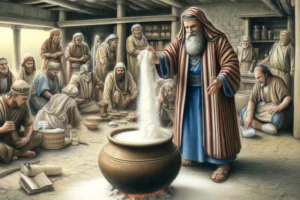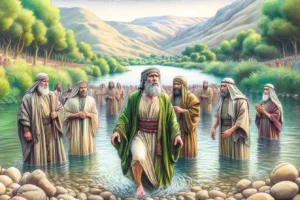
Purification of Water by Elisha
The story of the Purification of Water by Elisha, as recorded in 2 Kings 2:19-22, contains several key elements. Here are some quick facts about this biblical event:
- Location: The miracle occurs at Jericho, where the local inhabitants confront Elisha about the poor quality of the city’s water.
- Problem: The water in Jericho is described as bad, causing death and miscarriage, rendering the land unproductive.
- Elisha’s Action: Elisha asks for a new bowl filled with salt, which he then casts into the spring of water.
- Symbolism of Salt: Salt, often symbolizing purity and preservation in the Bible, is used by Elisha to cleanse and heal the waters.
- Miracle: Elisha declares that the Lord has healed the waters, and they are cured permanently, with no more death or unproductivity resulting from them.
- Long-lasting Effect: The text notes that the water remained purified “to this day,” emphasizing the enduring nature of Elisha’s miracle.
The purification of the waters of Jericho by Elisha, recounted in 2 Kings 2:19-22, is a significant miracle that showcases the prophetic authority and divine empowerment of Elisha. This event occurs shortly after Elisha takes up the mantle of leadership from Elijah, marking an early and defining moment in his ministry. Here’s a detailed analysis of this passage:
Context and Background
This miracle takes place in Jericho, a city with historical and theological significance, often remembered for its walls falling before Joshua (Joshua 6). After Elijah’s dramatic ascent into heaven, Elisha returns to Jericho, where the inhabitants confront him with a severe problem: the city’s water is undrinkable and the land is barren, causing death and miscarriage.
Theological Significance
The miracle serves multiple theological purposes:
- Demonstration of God’s Power: Elisha’s act illustrates the transformative power of God through His prophet. By healing the waters, Elisha is not only resolving a practical issue but also demonstrating that God cares about the wellbeing of His people.
- Continuity of Prophetic Authority: The miracle underscores the continuity between Elijah and Elisha. Just as Elijah performed miracles that demonstrated control over nature (such as calling down fire from heaven or causing a drought), Elisha’s actions affirm that he has inherited similar authority.
- Symbolism of Salt: The use of salt, which is often used biblically to symbolize purity and a covenant of preservation (Leviticus 2:13; Numbers 18:19), signifies the restoration of the water’s purity and by extension, the land’s fertility.
Literary Analysis
The narrative employs straightforward, historical reporting of the facts, common to many of the prophetic narratives in Kings. The locals’ plea to Elisha highlights the direness of their situation, emphasizing the impact of Elisha’s intervention. The miraculous transformation of the water from death-inducing to life-sustaining through the simple act of throwing salt is powerful in its simplicity, emphasizing that the power comes from God, not the actions or objects themselves.
The Miracle’s Process
Elisha’s request for a “new bowl” with salt might symbolize a new beginning for Jericho. His throwing of the salt into the spring and proclaiming, “Thus says the Lord, ‘I have healed this water; from now on neither death nor miscarriage shall come from it’,” is a declarative act that establishes the miracle as an act of God’s word and promise.
Lasting Impact
The text concludes with a note that the water “has been healed to this day,” a statement that serves to authenticate the miracle’s permanent effectiveness and Elisha’s prophetic legacy. This reassurance would have been significant for the original audience and for later generations, affirming the reliability of God’s interventions through His prophets.
Conclusion
The purification of the waters of Jericho is emblematic of Elisha’s role as a life-giving force through whom God acts to heal and restore. This event not only alleviates immediate physical suffering but also reinforces the themes of divine care and renewal, central to the prophetic messages in the books of Kings. It’s a powerful demonstration of how God uses His prophets to enact change and deliver His people in times of need.
Leave A Reply
You must be logged in to post a comment.




1 Comment